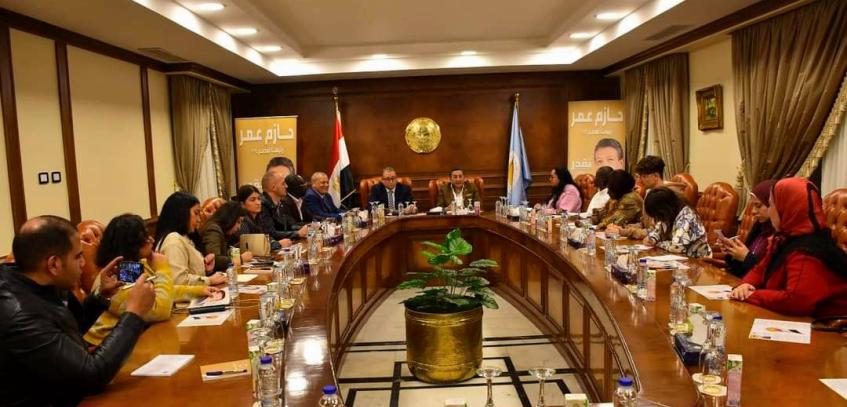Excellencies, Distinguished Members of the Egyptian National Electoral Commission, Friends and colleagues’ members of the International Integrity Coalition (NAZAHA), Ladies and gentlemen’s Members of the Media and the Press.
The Economic, Social, and Cultural Council of the African Union, representing the voice of the African citizenry, is privileged to participate in this historically significant event that plays a pivotal role in shaping the nation’s democratic and progressive trajectory. As a constituent of the international Integrity Coalition (NAZAHA) overseeing the international monitoring of the Egyptian presidential elections.
Egypt, with its rich history as the land of messengers and prophets, the cradle of civilizations, and the crossroads of continents, occupies a special place in the hearts of African citizens. AU- ECOSOCC aligns its stance with the official position of the African Union Commission, commending the outstanding, effective, and valuable contributions of the Egyptian National Electoral Commission. Their dedicated work in meticulously completing logistical preparations for the presidential elections, along with the issuance of comprehensive documentation outlining the electoral process from voting initiation to conclusion, including the sequencing of procedures within sub-committees and general polling stations, has been duly acknowledged.
Article 36 within the framework of the Egyptian National Electoral Commission stands as an authentic assurance for the successful execution of the electoral process, showcasing its most commendable facets to the global community. Rigorous oversight at each phase, spanning voter registration through polling days to the final tallying and sorting of votes, aligns with international and African Union benchmarks for conducting elections that are free and fair. The legal underpinning, encompassing the constitution of the Arab Republic of Egypt and pertinent laws governing the electoral process, coupled with decisions promulgated by the National Electoral Commission, reinforces transparency and adherence to established methodologies.
The Economic, Social, and Cultural Council of the African Union extends commendation for the neutrality, integrity, and transparency demonstrated in the Egyptian presidential elections—an achievement that stands out as unprecedented during pivotal moments. This success is not only manifested in the substantial voter turnout but also in the broad participation of diverse demographics, including women, youth, the elderly, and individuals with disabilities. We recognize the efforts to facilitate access for seniors and those with special needs at monitored centers, underscoring a commitment to inclusivity through meticulous preparation of polling stations and the implementation of measures to ease their voting experience.
The noteworthy judicial oversight of the electoral process, establishing a precedent in both African and Arab nations, merits accolades. The presence of judges as leaders and members of voting committees over the three days of voting underscores their professionalism, neutrality, and transparency. Their collaborative approach with observers and comprehensive understanding of voting procedures significantly enhances the overall credibility of the electoral process. Moreover, our Council expresses appreciation for the security strategies devised by the pertinent ministry to safeguard the electoral process. Acknowledging the significance of examining effective security practices, these initiatives enhance the potential for favorable outcomes and enable meticulous planning for the seamless implementation of exemplary security measures, thereby guaranteeing a secure environment for citizens to freely exercise their voting rights.
The Economic, Social, and Cultural Council of the African Union recognizes the extraordinary advancements in development, economic and strategic transformation, and diversification observed in Egypt in recent years. This progress establishes a crucial framework for all human development initiatives, making a significant international contribution to sustainable development for generations to come.
In conclusion, the Economic Social and Cultural Council underscores that the ultimate triumph in these Egyptian presidential elections is determined by the will of the Egyptian people. This outcome charts a course towards a robust, modern, and advanced future for Egypt.





